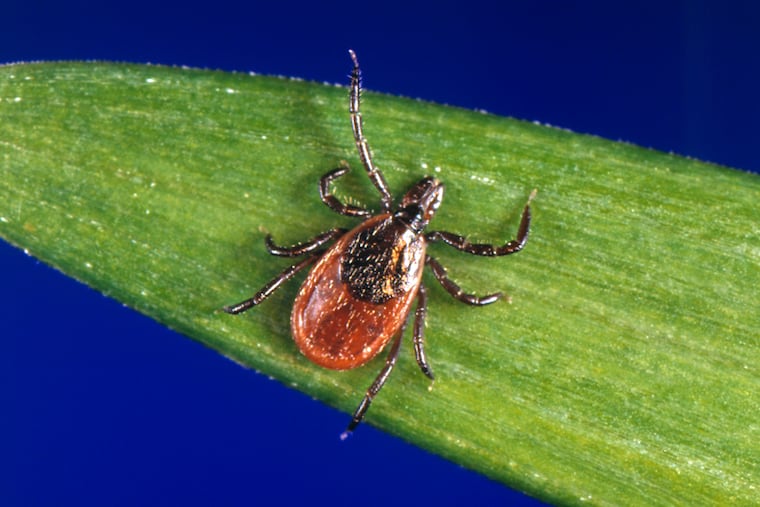Lyme disease cases are on the rise. Here’s how to protect yourself from tick-borne illnesses.
Lyme disease cases have been rising in Philadelphia and nationally. So far this year, Chester County has the highest number of cases locally.

In the city of Philadelphia, the summertime dangers posed by ticks aren’t necessarily top of mind for residents. But with one of the most extensive parks systems in the country, Philadelphia health officials are warning that it’s still possible to pick up ticks that frequent leafy, green areas — and the serious diseases they spread.
Between 2013 and 2023, health department workers found blacklegged ticks, also known as deer ticks, at 18 out of 25 sites regularly checked for ticks. More than a third of them tested positive for Lyme disease, the state’s most common tick-borne illness.
“We’re a city, and people don’t expect it,” said Dana Perella, program manager for the city health department’s acute communicable disease program.
Lyme disease causes a telltale circular rash at the site of a tick’s bite, and can also cause a fever, chills, fatigue, and muscle aches. A person can later develop complications like headaches, rashes elsewhere on the body, drooping facial muscles, severe arthritis, and even heart palpitations and brain inflammation.
Because early symptoms of Lyme disease and other tick-borne diseases can mimic the flu, cases may go undetected.
“The symptoms can be very nonspecific. It may be like a summertime flu, and with COVID still around, folks may get confused about that, too,” Perella said. “It’s good to speak with your doctor, particularly if you’ve had extensive outdoor exposure, and you’re having these kind of flulike symptoms during summer time.”
A national rise in Lyme cases
Nationwide, cases of Lyme disease have been rising since the 1990s, despite a sharp drop in reported cases in 2020 and 2021, the first two years of the COVID-19 pandemic.
Philadelphia saw around 200 cases of Lyme disease a year between 2015 and 2021. The city reported 325 cases in 2022, the last year for which complete data were available.
That spike is due in part to a change in the Centers for Disease Control and Prevention’s Lyme disease reporting requirements for areas like Pennsylvania that typically see high incidences of the disease. Previously, health departments had to confirm Lyme disease cases based on lab testing and a physician’s clinical observations, but now, they can confirm cases through lab testing alone.
Case counts for Philly area and Pa.
In Pennsylvania (excluding Philadelphia, which keeps its own data), reported cases of Lyme disease dropped significantly in 2020 and 2021 during the COVID-19 pandemic. In 2022, the first year with the new reporting requirements, cases spiked to more than 8,400 and jumped again to more than 11,000 in 2023.
So far this year, the state has reported more than 3,800 Lyme disease cases.
In the Philadelphia suburbs, Chester County has the highest number of Lyme disease cases among residents, with 376 confirmed as of June 26.
The rise nationally may be linked to climate change, as higher temperatures can increase the population of disease-spreading ticks and mosquitoes, putting more people in a wider swath of the country at risk, the CDC says.
Other tick-borne diseases
Philadelphia also sees a handful of cases of other tick-borne illnesses per year, including anaplasmosis and babesiosis, which cause similar symptoms to Lyme disease but can be particularly dangerous for immunocompromised people. Both are also spread by the blacklegged tick.
The city logged one case of Powassan virus in 2020. In severe cases, this can cause encephalitis, an inflammation of the brain, or meningitis, an inflammation of the membrane around the brain and spinal cord. The case was likely contracted elsewhere in the state, city officials said.
Health officials have also identified Lone Star ticks in the city, which can cause a person to become allergic to red meats and spread other viruses.
Preventing tick-borne illnesses
Philadelphia’s health department regularly checks in with neighborhood associations and block captains to make them aware of the potential of tick- and mosquito-spread diseases.
“We provide guidance on steps with groups that are likely to do cleanups about how to make outdoor areas less friendly to mosquitoes and ticks, like making sure you’re clearing leaf litter and mowing any grassy areas,” Perella said. Neighborhood groups can also make sure that children’s play areas are not situated next to wooded areas and use wood chips to create barriers between people and the areas that ticks frequent.
Here’s what else you need to know to protect yourself:
People should wear bug spray with at least 20% of DEET, the insect-repelling chemical, if they walk through brush or tall grasses or in heavily wooded areas. Clothing and hiking gear treated with the insecticide permethrin can also repel ticks. Pets should be treated with a tick repellent as well.
When hiking, people should stay in the middle of a trail.
Showering or taking a bath once home can help remove ticks, and a 10-minute high heat cycle in a dryer can kill them on clothing and gear.
People should conduct a full-body check for ticks on themselves and any pets, Perella said, and remove any they find as soon as possible.
Use tweezers to pull ticks off, and don’t use home remedies like smothering a tick in Vaseline. Then, wash the area with soap and water.
For more information on tick-borne diseases statewide, check this dashboard of case counts (excluding Philadelphia) maintained by the Pennsylvania health department. In Philadelphia, health officials have also issued information about tick-borne diseases and advice on preventing tick bites.